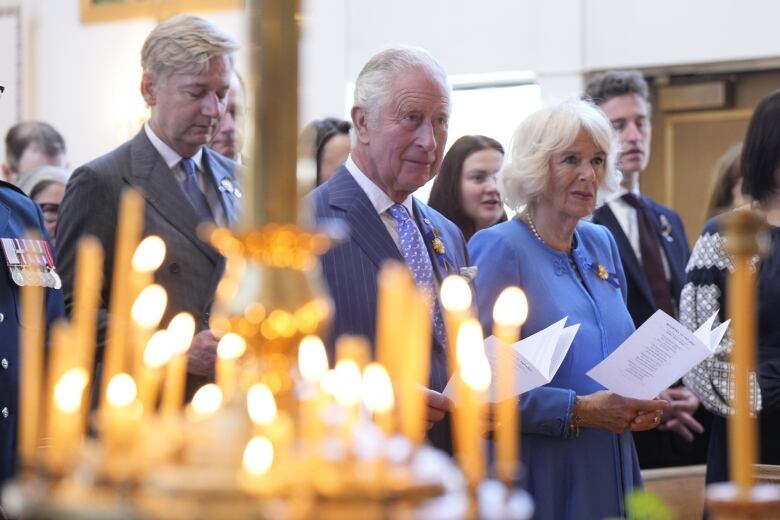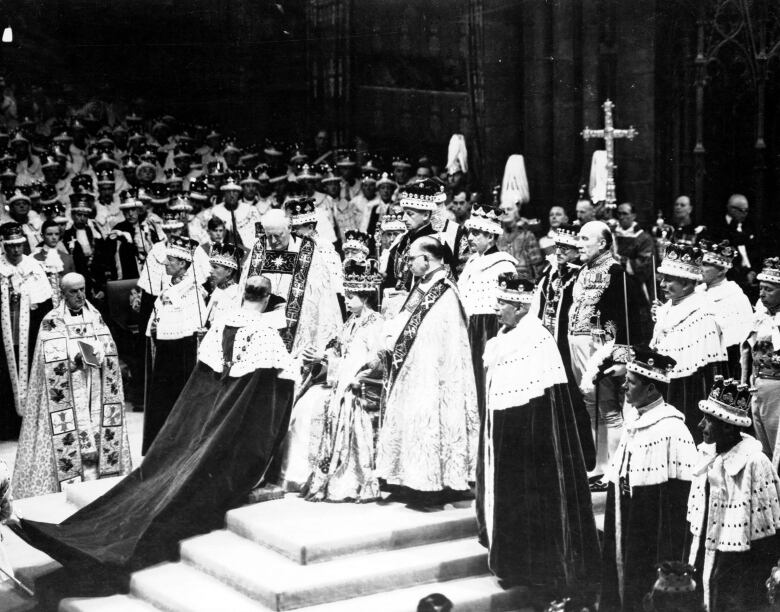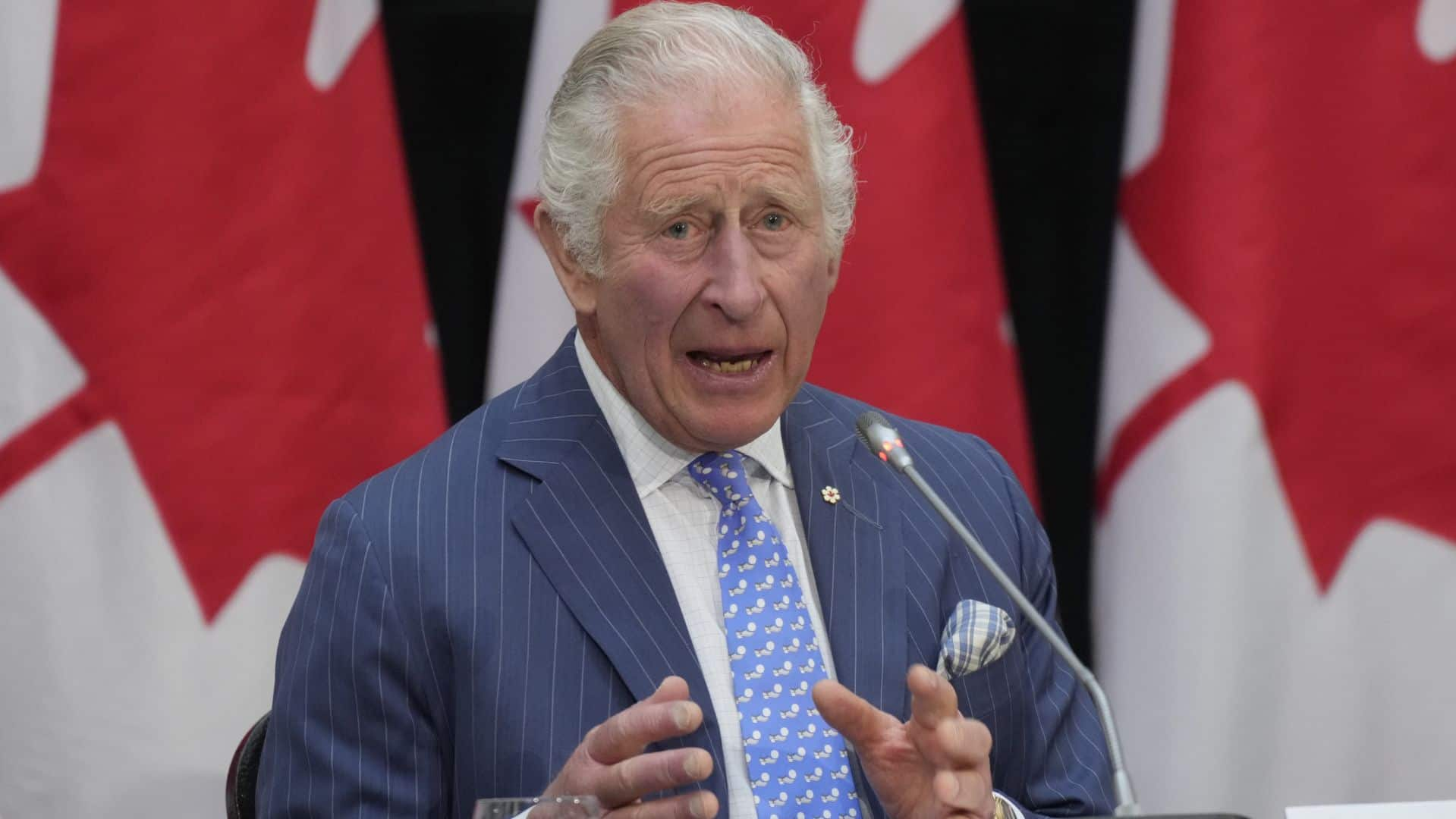King Charles will have a new title in Canada now that the federal government has dropped a centuries-old accolade — “defender of the faith” — as part of a push to redefine the head of state’s role.
The coronation on Saturday is a religious affair. The archbishop of Canterbury, the Church of England’s de facto leader, will preside over the event, which will include anointing Charles with holy oil consecrated by Anglican and Orthodox clerics in Jerusalem.
Prime Minister Justin Trudeau will be on hand for the church service — it’s essentially an Anglican Eucharist, except with more royal pomp and pageantry — but his government has signalled it’s not interested in continuing the monarch’s religious role in Canada.
CBC’s coverage of the coronation of King Charles will be available across all platforms on May 6 starting at 4 a.m. ET on CBC TV, CBC News Network, CBC Radio and streaming on CBC Gem, CBC News Explore, and CBC Listen.
The “defender of the faith” title dates back to the Tudor period in the 16th century and refers to the monarch’s unique role as the “supreme governor” of the Church of England — the state religion established after King Henry VIII pulled English churches from papal control.
It recognizes the duality of the King’s role: he’s both the sovereign and a religious figure. He’s at the centre of the Westminster system of parliamentary democracy and he also has some divine duties.
WATCH: King Charles won’t be known as ‘defender of the faith.’ Does it matter?
King Charles will have a new title in Canada now that the government has dropped “defender of the faith” — part of a push to redefine the head of state’s role.
Buried deep in the Trudeau government’s recent budget bill, however, is a measure that will break Canada away from that tradition.
For the first time since Confederation, the royal title of the Canadian monarch will not include the “defender” role or an explicit reference to Charles’s Christian faith.
The mention of “God” remains, as it does in the first line of the Charter of Right and Freedoms.
The monarch will be known officially in this country as “Charles the Third, by the Grace of God King of Canada and His other Realms and Territories, Head of the Commonwealth.”

“They want to drop the title because there is this desire to modernize,” said Justin Vovk, a historian of the Royal Family at McMaster University.
“There is very much a push — a sense of urgency — to show Canadians why the monarch is modern, to show Canadians it has a place in the 21st century.”
Vovk said the overt religiosity of the “defender” title is something that’s open to “critique, criticism and questioning” in an increasingly secular Canada.
“Charles really needs to reflect the country that he presides over as head of state,” he said.

When the late Queen Elizabeth II ascended to the throne in 1953, Canada’s then prime minister Louis St-Laurent, a Catholic, conceded it was a “delicate” issue even then.
He ultimately decided, after conferring with his cabinet, to keep the “defender” reference in the Queen’s Canadian title.
“There could be no reasonable objection from anyone who believed in the Supreme Being in having the sovereign, the head of the civil authority, described as a believer in and a defender of the faith,” St-Laurent said.
And even as other Commonwealth realms moved on (Australia, for example, dropped the title in 1973), Canada kept the reference to the Queen’s church position throughout her long reign.
“A decision was made to modernize the title to bring Canada in line with other Commonwealth countries,” said a spokesperson for the the King’s Privy Council, which is overseen by cabinet minister Bill Blair.

The government’s decision to scrap the title and upend centuries of royal history has been met with a collective shrug in this country.
Canadians are increasingly irreligious; the country has fewer professed Christians now than it did when Elizabeth assumed the title.
In 1991, for example, 12.5 per cent of Canadians reported no religious affiliation, according to Statistics Canada data. In 2019, the agency reported a big jump: 26.3 per cent said they have no religion at all.
About 63 per cent of Canadians are self-professed Christians. Another 10.4 per cent follow other faiths.
But research by Cardus, a religious think tank, suggests even fewer Canadians (about 19 per cent) regularly attend a religious service and can be considered “very religiously committed.”
WATCH: King Charles’s deep ties to Canada
Britain’s new monarch King Charles has deep ties to Canada, forging connections with some Canadians through his charitable work and outreach during his many visits to the country.
There’s also no “official” church in Canada.
The Anglican Church of Canada, a church with ties to the Church of England as part of the Anglican Communion, is a smaller entity than it was 70 years ago — and the King has no official role in that church anyway.
“I understand the historical antecedents for it but there hasn’t been any degree of religious establishment since really the early 19th century in this country,” said Andrew Bennett, Canada’s former religious freedom ambassador.
“We don’t have an established church. We also don’t have a majority of the population that are practicing Christians these days. So it makes perfect sense. I think it’s appropriate,” he said of the government’s decision.
Bennett, an ordained deacon in the Ukrainian Greek-Catholic Church, also said he’s heartened by the fact that the government will retain the reference to “God” when defining Charles’s role.
A ‘higher authority’
“God is still present there. That’s really important,” he told CBC News.
“We have a significant proportion of the population in Canada that confess a belief in God or, certainly, in the divine. And so that I think is a reflection of who we are also as a people.
“And I think it’s important to have our monarch having even someone above him, that being God, that he also has to report to — someone that is a higher authority than even him.”

Charles himself once floated the idea of tweaking the title, suggesting it could become “defender of faith” (by dropping the “the”) to better represent the religious diversity of modern Britain and the Commonwealth realms.
The idea didn’t go over well with some in the Church of England establishment who said the King is constitutionally bound to protect and defend the state church.
Unlike in Canada, the British prime minister has some authority over church governance and bishops sit in the House of Lords, the upper house. In the U.K., the church is fully intertwined with the affairs of the state.
Reaching out to other faiths
But that hasn’t stopped Charles from indicating he’s open to other religious traditions.
For decades, Charles has shown an interest in Islam in particular, and has called for better relations between the West and the Muslim world.
To that end, Charles’s coronation will include religious leaders from other faiths for the first time.
Buddhist, Hindu, Jewish, Muslim and Sikh leaders will take part in various aspects of the coronation.
Safwan Choudhry speaks for the Ahmadiyya Muslim community in Canada.
He said Ahmadi Muslims respect the Crown because past monarchs allowed religious freedom to flourish in places like the British Raj, a former colony that included modern-day India, Pakistan and Bangladesh.
“They were colonizers — and no one enjoys being colonized — but they never abandoned religious freedom,” Choudhry said of past King-Emperors like George V, the King’s great-grandfather.
“Under British rule, all faiths, regardless of denominations and beliefs and how they identified, were allowed to not only practice but profess and proselytize their faith.

“It’s a tradition and a value that they’ve maintained to this day — not only in the United Kingdom but in many of its former colonies, including Canada.”
Choudhry said Charles’s inclusion of different faiths in his coronation service is a sign that he’s open to religious diversity — and amenable to adapting long-held traditions to respond to the changing demographics of his subjects.
“What King Charles will do and what will be his legacy remains to be seen,” Choudhry said.
“But we’ve already seen his inclusive mindset, his open-mindedness to learn about other faiths, religions, point of views and beliefs, including Islam.”






More Stories
What Trudeau’s podcast appearances say about the Liberals’ next ballot box question
ANALYSIS | In videos and podcasts, Poilievre and Trudeau are eager to explain themselves — at length | CBC News
South Africa celebrates 30 years since end of apartheid, but discontent grows – National | Globalnews.ca